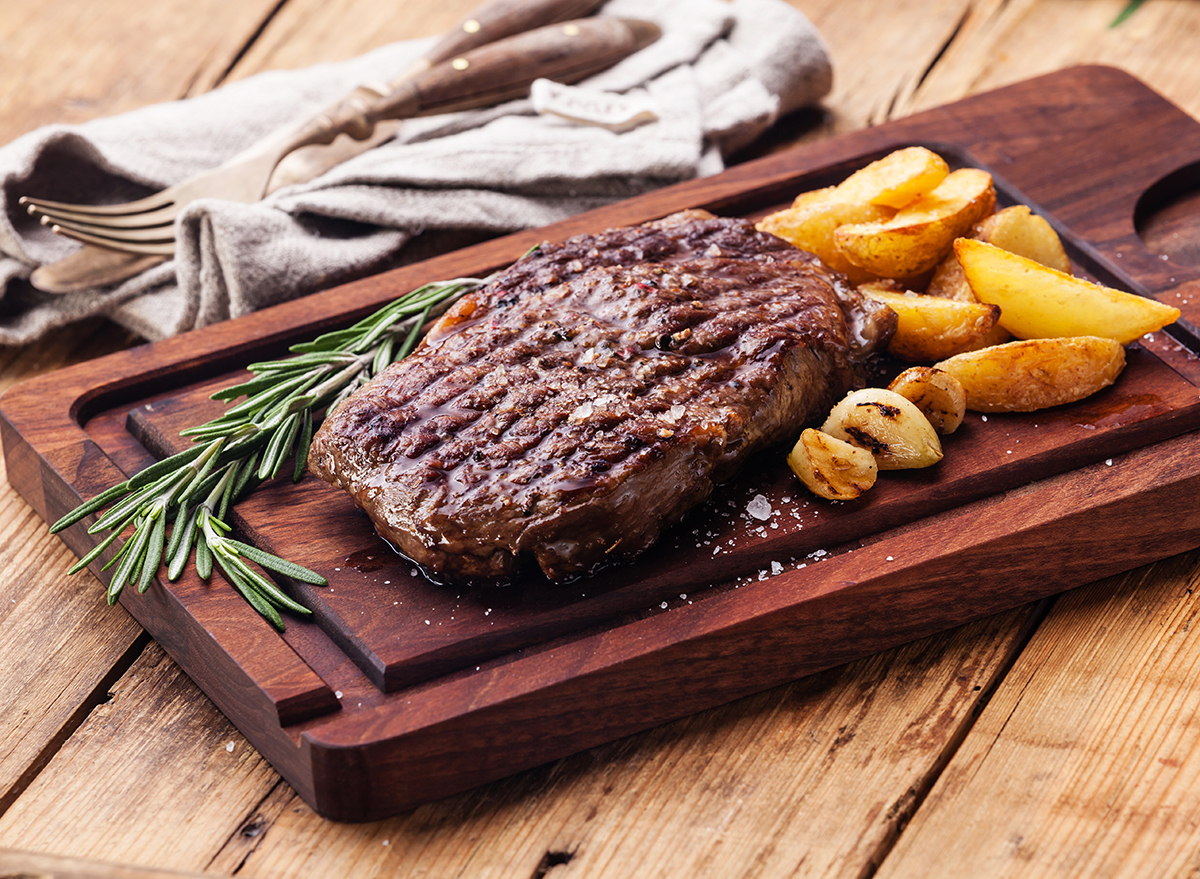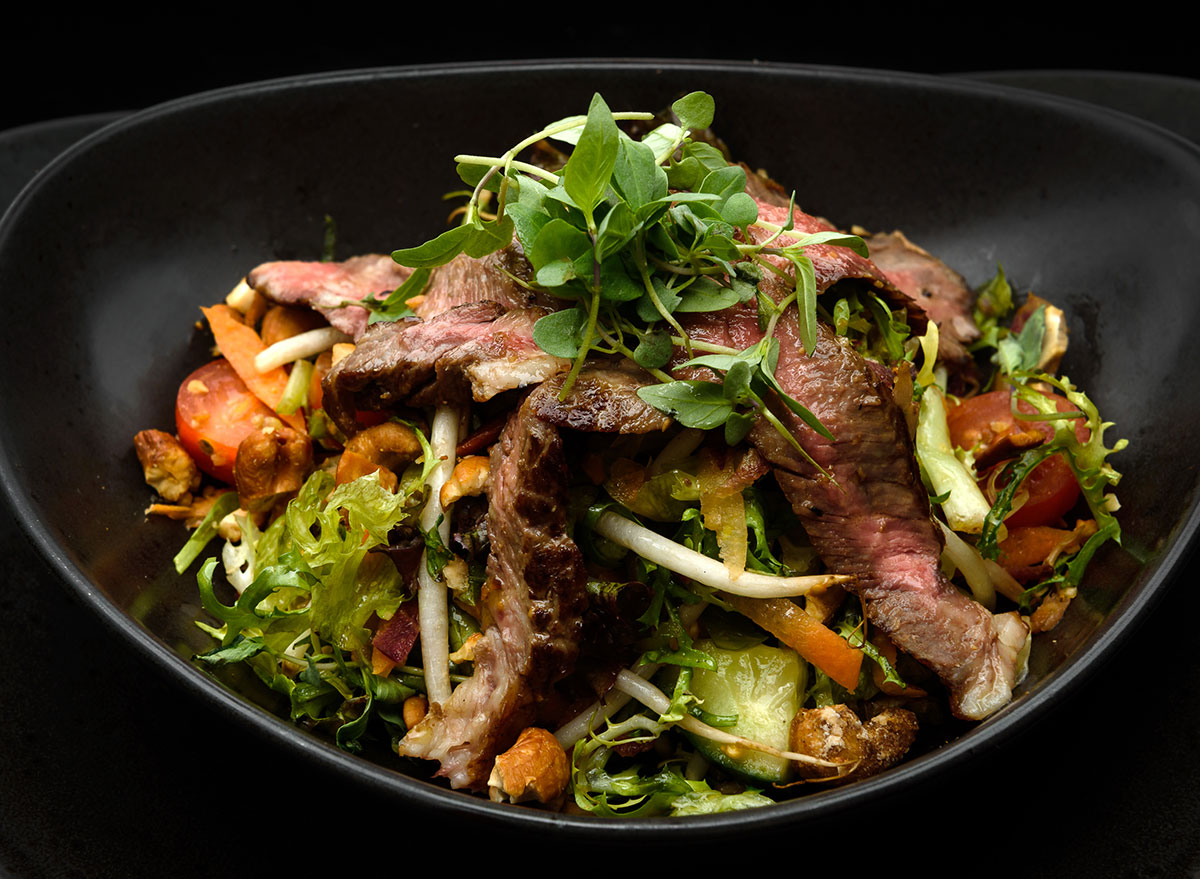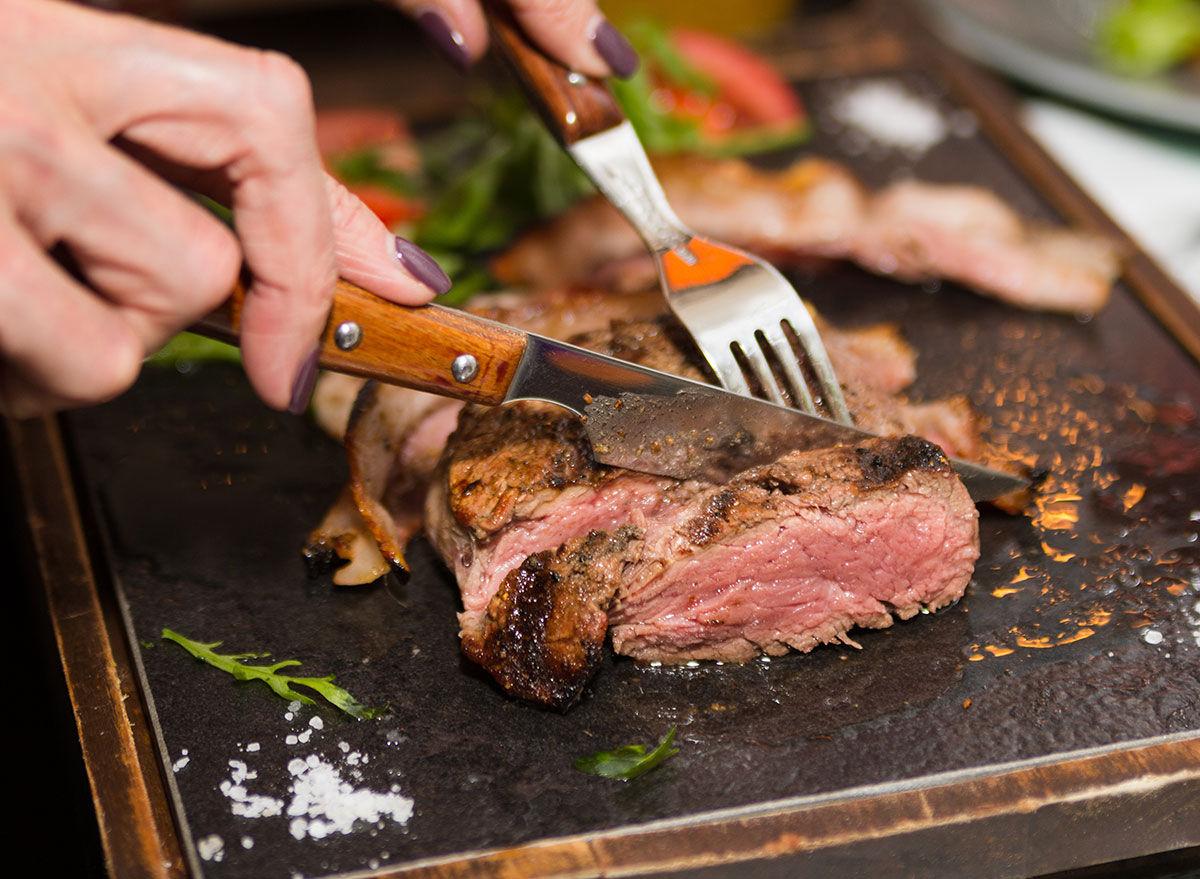What Happens to Your Body When You Cut Red Meat From Your Diet

Misinformation that President Joe Biden wants Americans to cut red meat consumption by 90% by 2030 as part of his climate initiative is swirling around the internet. This specific number was used to misrepresent what the president actually said about his initiative, which seeks to reduce greenhouse gas emissions by 50% within the next nine years, according to CNN.
Many are falsely claiming that Biden wants to create mandates on the average American diet because of an academic paper that was published by the University of Michigan’s School for Environment & Sustainability. The paper proposed limiting red meat consumption as a solution for cutting greenhouse gas emissions, but it was never a mandate from the president himself. It was originally released on Jan. 13, 2020, or more than a year before Biden was even elected to the nation’s highest office.
Why does cutting red meat consumption make such a difference in regards to the environment? It has to do with livestock. According to the United States Environmental Protection Agency (EPA), agriculture—including livestock production—represents 10% of total emissions, which the Food and Agriculture Organization (FAO) points out a majority of it comes from beef production. By reducing consumption and replacing it with plant-based products, the total emissions would significantly decrease. The paper suggested that cutting 90% of red meat consumption is the answer, which is where that specific number originated from.
While cutting red meat consumption is merely a suggestion from this academic paper—and not one from the president—it still calls into question the impact that red meat can have on one’s individual health and the environment. There’s no denying that there are a few health benefits of keeping red meat in your diet, but if you’re consuming a significant amount of red meat on a daily basis, you’re likely experiencing a few negative side effects.
If you’re thinking of cutting your red meat consumption—either in the name of health or in the name of decreasing your carbon footprint—here’s what happens to your body when you cut it from your diet. And for even more healthy tips, be sure to read about The One Vitamin Doctors Are Urging Everyone to Take Right Now.
You may experience a decrease in inflammation.

Depending on how the red meat is produced, your body may be experiencing some inflammation as a result of the fat content. Typically, red meat has a significant amount of saturated fat in it, and if you’re consuming more than the allotted amount your body should have in a day, your body may experience inflammation.
The average American should limit their saturated fat intake to no more than 6% of their calories, according to the American Heart Association. For a 2,000 calorie diet, that’s 120 calories—or 13 grams of saturated fat—per day. The average 4 oz. burger patty of 80/20 (80% lean meat, 20% fat) ground beef has around 5 grams of saturated fat in it alone, per The University of Rochester Medical Center.
Cutting red meat from your diet can help to significantly decrease your saturated fat intake, which will in turn help with any inflammation you may be experiencing from the meat. Along with inflammation, here are 6 Subtle Signs You’re Eating Too Much Red Meat.
You’ll lose the chance to get some beneficial nutrients.

That’s right—red meat is not all that bad. In fact, having red meat in your diet can be a great way to get some of the nutrients you need that would otherwise be hard to get.
In a 4 oz. serving of 80/20 ground beef, you get a significant amount of calcium, choline, magnesium, niacin, phosphorus, potassium, selenium, vitamin B12, and zinc. These nutrients help with your body’s energy production, growth and development, immune function, and red blood cells. Plus, they can even help boost your mood.
Depending on the type of red meat you buy, you can also get a boost of omega-3 fatty acids. Grass-fed beef tends to be leaner due to the diet of the cattle, which is mainly grass and hay, according to the University of Berkeley Wellness. This means the meat has a higher count of omega-3 stored in it. Though the omega-3 fatty acids in grass-fed beef aren’t as significant as the ones in fish, grass-fed beef can still be a good source of omega-3 fatty acids if you decide to grill up your burgers using this particular cut of meat.
Related: What’s the Difference Between Omega-3, -6, and -9? A Registered Dietitian Explains
Your iron count may be low.

Iron is an incredibly important nutrient for your diet due to its capacity to boost red blood cells. Iron deficiency can actually lead to decreased oxygen-carrying capacity, as well as an increased risk for infections and even heart problems. Plus, low iron levels make you feel exhausted.
According to the National Institutes of Health through the U.S. Department of Health & Human Services, the average American adult (between the ages of 19 and 50) should have between 8 to 18 milligrams of iron per day. Men can have as low as 8 milligrams, while women need up to 18. Pregnant women need up to 27 milligrams!
That 4 oz. 80/20 burger patty will give you 2.15 milligrams of iron, which is between 11% and 20% of your daily intake.
If you decide to cut red meat, either for environmental or health reasons, be sure you’re enough getting iron in other places in your diet. Here are The Best Iron-Rich Foods—And Why You Need Them in Your Life.
Your cholesterol levels will go down.

If you have high cholesterol, you’ve likely heard your doctor tell you to cut red meat from your diet. It all comes back to saturated fat, a main culprit for producing LDL “bad” cholesterol in your body, which leads to an increased risk of cardiovascular disease. Saturated fat raises your LDL cholesterol levels in your bloodstream, according to the Mayo Clinic. Red meat and dairy products—as well as baked goods, fried foods, and other highly processed foods—tend to have high amounts of saturated fat in them, leading to high cholesterol.
Your risk of chronic diseases will decrease.

If you cut red meat, you’ll find yourself with a significantly decreased risk of cardiovascular disease due to the decreased saturated fat in your diet. One recent study did show that eating unprocessed red meat may increase your risk of cardiovascular disease, as well as cancer.
Plus, the study also shows that eating more plant-based proteins (such as tofu, peans, nuts, and beans) can significantly decrease your risk of developing heart disease or dying prematurely. Here’s why Eating Too Much Red Meat Could Lead to Heart Disease.
Overall, if you cut red meat from your diet and focus on lean proteins or even plant-based proteins, you’ll see significant improvement in your health. And clearly, it will also make a significant impact on the environment, according to the University of Michigan’s report.
However, that doesn’t mean that you have to cut red meat out entirely. The report mentions reducing beef consumption—not giving it up completely. As demonstrated, red meat can still provide your body with a myriad of health benefits, especially if you go for grass-fed beef.
The World Cancer Research Fund recommends limiting consumption to about three portions (12-18 oz.) of cooked unprocessed red meat per week. Even limiting your red meat intake to this amount would make a significant difference for the environment—as well as your health.